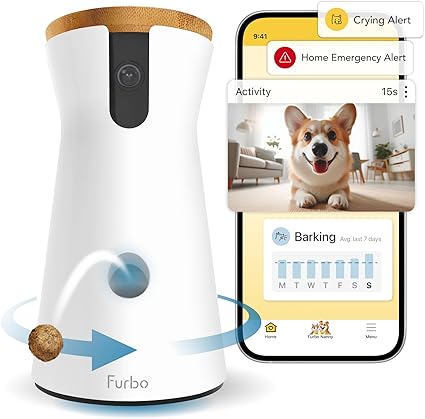Dogs are known for their insatiable curiosity, especially when it comes to food. As a responsible pet owner, you’ve probably asked yourself, “Can my dog eat this?” countless times. The problem is, not all foods that are safe for humans are safe for our canine companions. In fact, some seemingly harmless treats can lead to severe health issues or even be fatal. This uncertainty can cause anxiety, especially when your dog eyes your dinner plate with those irresistible puppy eyes.
Imagine the momentary panic when you realize your dog just snatched a piece of raw chicken or gulped down a pickle. The fear of the unknown—whether your furry friend will be okay—can be overwhelming. It’s these common but nerve-wracking scenarios that make it crucial to understand what’s truly safe for dogs to consume.
But worry not! This comprehensive guide is here to help. We’ll answer pressing questions like “Can dogs eat shrimp?” or “Can dogs eat salmon?”, and delve into less commonly discussed foods such as papaya, pecans, and even egg shells. By the end of this article, you’ll have a clear understanding of which treats are safe, which are dangerous, and which should be avoided altogether. Your dog’s health and happiness are just a read away.
Table of Contents
Can Dogs Eat Shrimp?
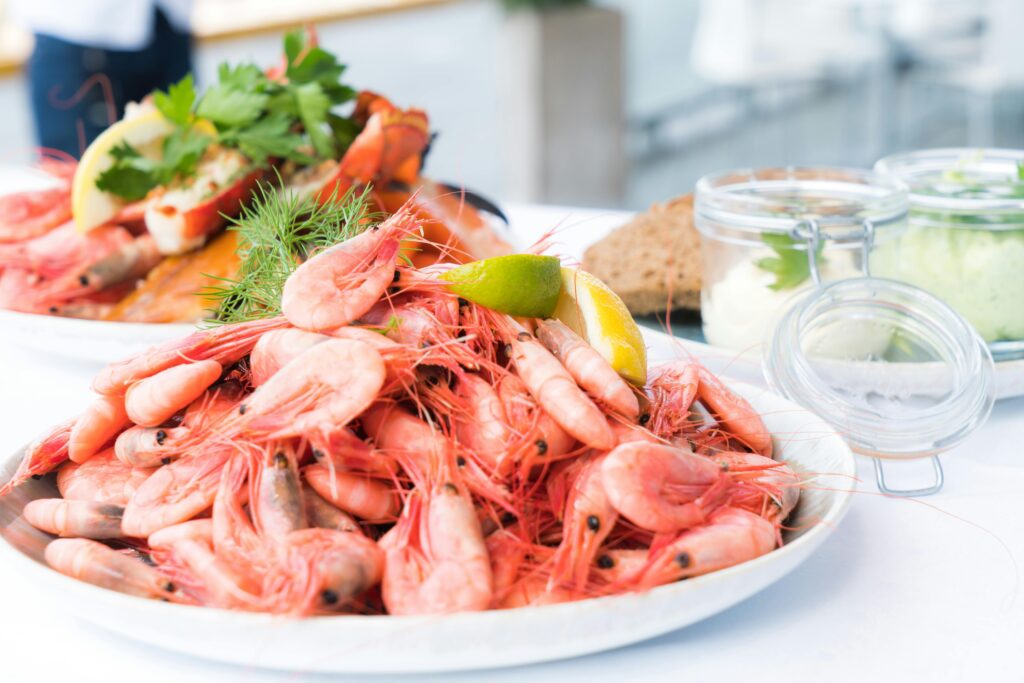
Dogs are omnivorous creatures, capable of consuming a wide variety of foods, but when it comes to seafood, caution is necessary.A common question is, “Can dogs eat shrimp?” The answer is yes, but there are some important considerations to keep in mind.
Shrimp, when properly prepared, can be a healthy treat for your canine companion. It is a low-calorie protein source rich in essential nutrients like vitamin B12, niacin, and phosphorus. These nutrients contribute to your dog’s overall health, aiding in metabolic processes and promoting strong bones. Additionally, shrimp contains omega-3 fatty acids, which are beneficial for maintaining a shiny coat and reducing inflammation.
However, before offering shrimp to your dog, it’s crucial to ensure it is cooked thoroughly. Raw or undercooked shrimp can harbor harmful bacteria like Salmonella orE. coli, which can lead to foodborne illnesses in dogs. Also, it’s advisable to remove the shell, tail, and vein, as these parts can pose a choking hazard or lead to digestive blockages.
Moderation is key when feeding shrimp to dogs. While shrimp is nutritious, it is also high in cholesterol. Excessive consumption can contribute to weight gain and potentially lead to pancreatitis, a severe and painful inflammation of the pancreas. Therefore, shrimp should be offered as an occasional treat rather than a regular part of your dog’s diet.
.
Can Dogs Eat Pickles?

When it comes to sharing food with our canine companions, it’s essential to know what’s safe and what isn’t. A common question among pet owners is, “Can Dogs Eat Pickles?” The answer is not simple, as it depends on various factors.
Pickles are cucumbers that have been soaked in a brine solution, which typically contains salt, vinegar, and various seasonings. While cucumbers in their natural state are safe for dogs and can even be a refreshing snack, pickles present a different scenario. The high sodium content in pickles is the primary concern. Excessive salt intake can lead to a condition known as hypernatremia, where the sodium levels in the blood become dangerously high. This can cause symptoms such as vomiting, diarrhea, lethargy, and in severe cases, seizures.
Furthermore, pickles often contain ingredients like garlic, onions, and various spices that are toxic to dogs. Garlic and onions, in particular, can cause hemolytic anemia, a condition where the red blood cells are destroyed faster than the body can replace them. This condition is not only painful but can also become life-threatening if not treated.
Additionally, the acidity from the vinegar can upset your dog’s stomach, leading to gastrointestinal discomfort. Even pickles that don’t contain harmful spices are still not ideal due to their high salt content and potential to cause bloating and dehydration.
Can Dogs Eat Raw Chicken?
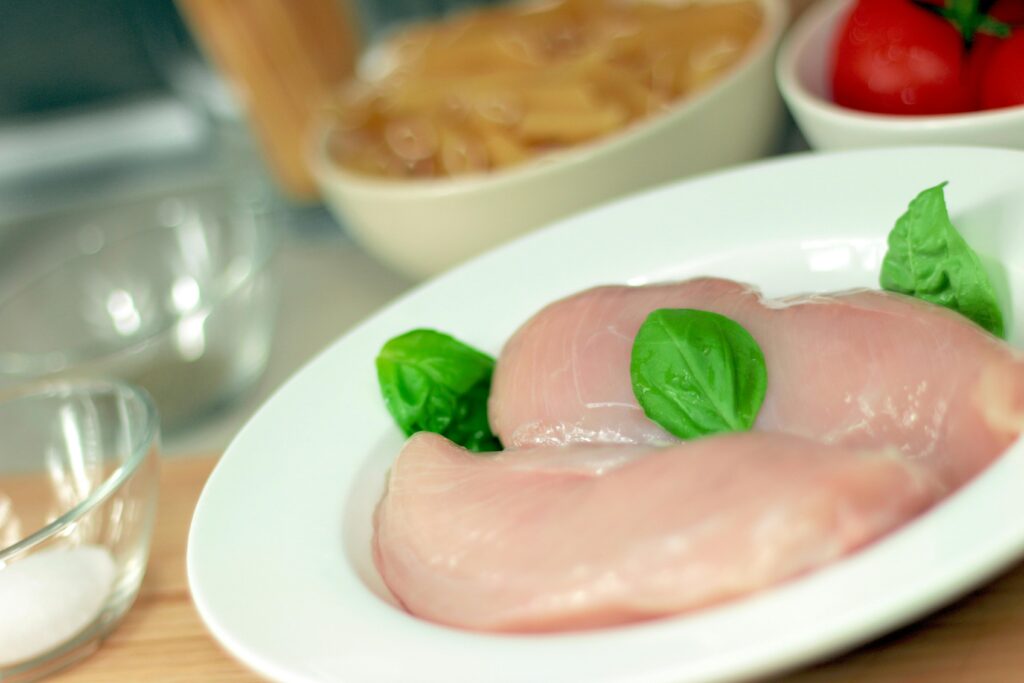
Feeding dogs a raw diet has become a trend among pet owners, but it raises important questions about safety and nutrition. One of the most debated topics is, “Can Dogs Eat Raw Chicken?“The response involves weighing the potential benefits against the considerable risks
Raw chicken provides a natural source of protein and essential nutrients. In the wild, canines would consume raw meat as part of their diet, and their digestive systems are built to process it efficiently. Raw chicken can provide dogs with vital nutrients such as protein, which is crucial for muscle development, and taurine, an amino acid that supports heart health.
However, there are substantial risks associated with feeding dogs raw chicken. The primary concern is the presence of harmful bacteria such as Salmonella and Campylobacter. These pathogens can cause severe foodborne illnesses, leading to symptoms like vomiting, diarrhea, fever, and lethargy in dogs. Moreover, dogs infected with these bacteria can shed them in their feces, posing a health risk to humans, especially children and the elderly.
Another concern is the potential for bones in raw chicken to cause physical harm. While some advocates of raw feeding argue that raw bones are safer than cooked ones, which can splinter, there is still a risk of choking, internal blockages, or perforations in the digestive tract.
Can Dogs Eat Olives?

Olives, those small, savoury fruits that have been a staple in Mediterranean cuisine for centuries, often find their way into the diets of pet owners. But can dogs eat olives safely? While olives are not inherently toxic to dogs, there are several factors to consider before offering them to your canine companion.
Firstly, plain, unsalted olives in moderation can be a safe treat for most dogs. They contain healthy fats, vitamins like Vitamin E, and antioxidants, which may contribute to overall health. However, it’s essential to avoid feeding dogs olives that are processed or contain additives, such as those soaked in brine, which are high in sodium. Excessive sodium can lead to dehydration or more severe health issues like sodium ion poisoning in dogs. The pits of olives are another concern; they can pose a choking hazard or cause blockages in a dog’s digestive system.
Moreover, olives marinated with garlic, onions, or other seasonings are particularly dangerous. Both garlic and onions are toxic to dogs and can lead to severe gastrointestinal upset or, in some cases, more serious complications like anaemia. Therefore, it’s critical to ensure that the olives offered are plain and free from harmful ingredients.
So, can dogs eat olives? The answer is nuanced. While plain, pitted olives in small quantities can be a healthy, occasional treat, they are not essential to a dog’s diet. Their high-fat content, although beneficial in moderation, can contribute to weight gain if overfed. It’s always advisable to consult with a veterinarian before introducing new foods into your dog’s diet. In conclusion, if your dog enjoys a small olive now and then, ensure it’s a safe and appropriate option for their unique health needs.
Can Dogs Eat Salmon?
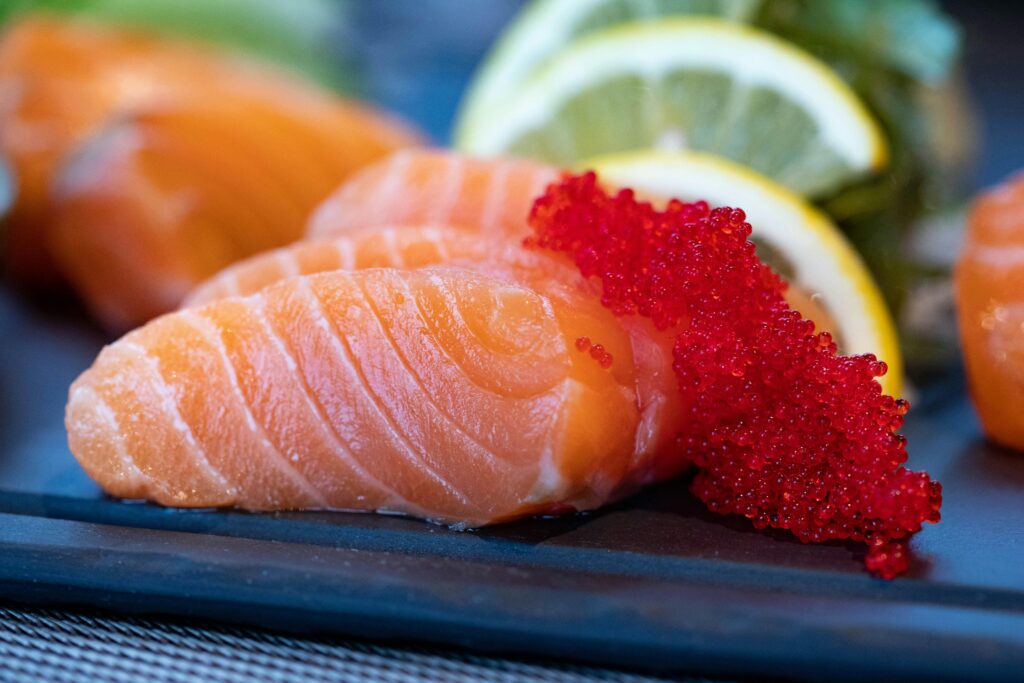
Salmon is often celebrated as a nutrient-rich food, packed with omega-3 fatty acids, vitamins, and minerals that promote heart health, brain function, and overall well-being. But can dogs eat salmon? The answer, when considering certain factors, is a resounding yes.
Cooked salmon can be a beneficial addition to a dog’s diet. Its high concentration of omega-3 fatty acids helps maintain a healthy coat, reduces inflammation, and supports joint health, particularly in older dogs. Additionally, salmon is an excellent source of protein, which is essential for muscle development and energy.
However, feeding salmon to dogs requires some caution. Raw salmon can carry parasites such as Neorickettsia helminthoeca, which can lead to salmon poisoning disease. This condition can be life-threatening if not addressed quickly.. For this reason, it’s critical to ensure that salmon is fully cooked before serving it to your dog.
When serving salmon, it’s also important to avoid varieties that contain added seasonings, oils, or preservatives. Salmon prepared with garlic, onions, or excessive salt can be harmful to dogs. Furthermore, always ensure that the salmon is deboned, as fish bones can cause choking hazards or injuries to a dog’s digestive tract.
So, can dogs eat salmon? Yes, but it must be prepared correctly. Cooked, unseasoned salmon, free from bones and additives, can be an excellent, nutritious treat for your canine companion. Including salmon in your dog’s diet, in moderation, can provide significant health benefits, enhancing their coat and overall vitality. As always, consult with a veterinarian before making any substantial changes to your dog’s diet to ensure that the introduction of salmon aligns with their specific health needs.
Can Dogs Eat Pecans?

Pecans, with their rich, buttery flavor, are a popular ingredient in many human dishes. However, when it comes to sharing this nutty snack with your canine friend, caution is essential. Can dogs eat pecans? The short answer is no—pecans are not safe for dogs.
Pecans contain juglone, a compound that can be toxic to dogs. Ingesting even a small amount of this substance can lead to gastrointestinal distress, including vomiting and diarrhea. Furthermore, pecans are high in fat, which can contribute to pancreatitis in dogs, a potentially severe condition. The high-fat content may also cause weight gain over time if consumed regularly.
Another concern with pecans is the risk of mold. Pecans can develop a specific type of mold called Aspergillus, which produces aflatoxins. These toxins can be extremely dangerous for dogs, potentially leading to liver damage or even death in severe cases. The mold may not always be visible, making it even riskier to feed pecans to your pet.
Additionally, pecans, like many other nuts, pose a choking hazard, especially if they are not chewed properly. The hard texture of the nut can cause blockages in a dog’s throat or digestive tract, leading to discomfort or more serious medical issues.
So, can dogs eat pecans? The answer is clear: pecans should be avoided in a dog’s diet. While some nuts, like peanuts and almonds, may be safe in moderation, pecans present too many risks. If you suspect your dog has ingested pecans, it’s best to contact your veterinarian immediately for advice. Protecting your dog from harmful foods is essential to maintaining their health and well-being.
Can Dogs Eat Cottage Cheese?

Cottage cheese, known for its creamy texture and mild flavor, is often a staple in many human diets. But can dogs eat cottage cheese? The answer, when handled correctly, is generally yes.
Cottage cheese is a good source of protein and calcium, making it a potentially beneficial addition to a dog’s diet. The protein content can help support muscle development, while calcium is essential for maintaining strong bones. Additionally, cottage cheese contains probiotics, which can aid in digestive health and promote a balanced gut flora for your dog.
However, there are important factors to consider. Cottage cheese is a dairy product, and while it is lower in lactose than many other cheeses, some dogs may still be lactose intolerant. For these dogs, consuming cottage cheese can lead to gastrointestinal discomfort, including bloating, gas, or diarrhea. It’s wise to introduce it gradually and observe how your dog reacts to this new food.
Another consideration is the fat content. Although cottage cheese is available in low-fat or non-fat varieties, full-fat versions can be quite rich. Feeding your dog too much high-fat food can contribute to obesity or pancreatitis, a condition that inflames the pancreas and requires immediate veterinary attention.
So, can dogs eat cottage cheese? Yes, in moderation, and preferably the low-fat or non-fat varieties. Plain, unseasoned cottage cheese can serve as an occasional treat or a supplement to a balanced diet. However, it’s important to avoid cottage cheese with added ingredients like onions or chives, which are harmful to dogs. Always monitor your dog’s response to cottage cheese and consult with your veterinarian to ensure it’s a suitable option for your pet’s specific health needs.
Can Dogs Eat Egg Shells?

Eggshells, often discarded without a second thought, are actually packed with nutrients. But can dogs eat eggshells? Yes, under the right conditions, eggshells can offer several health benefits for dogs.
Eggshells are an excellent source of calcium, an essential mineral that supports bone health, muscle function, and proper growth. Adding eggshells to your dog’s diet can be particularly beneficial for dogs that need a calcium boost, such as puppies or older dogs with joint issues. Ground eggshell powder is also commonly used as a natural calcium supplement, especially for those dogs on a homemade diet that may lack this vital nutrient.
However, it is crucial to prepare eggshells properly before feeding them to your dog. Raw eggshells can carry bacteria like Salmonella, which can pose health risks to both pets and humans. To make them safe, eggshells should be thoroughly cleaned, boiled, and then ground into a fine powder. Feeding whole eggshells or large pieces can be dangerous, as they can be sharp and may cause damage to your dog’s digestive tract.
Another consideration is moderation. While eggshells are a great source of calcium, too much calcium in a dog’s diet can lead to health problems, particularly for growing puppies. Over-supplementation can cause skeletal issues and other complications, so it’s essential to consult with your veterinarian to determine the appropriate amount for your dog.
So, can dogs eat eggshells? Yes, but they should be carefully prepared and fed in moderation. When done correctly, adding eggshell powder to your dog’s meals can provide a natural and beneficial calcium source, contributing to their overall health and well-being. As always, monitor your dog’s health and seek professional advice to ensure this addition is right for them.
Can Dogs Eat Papaya?
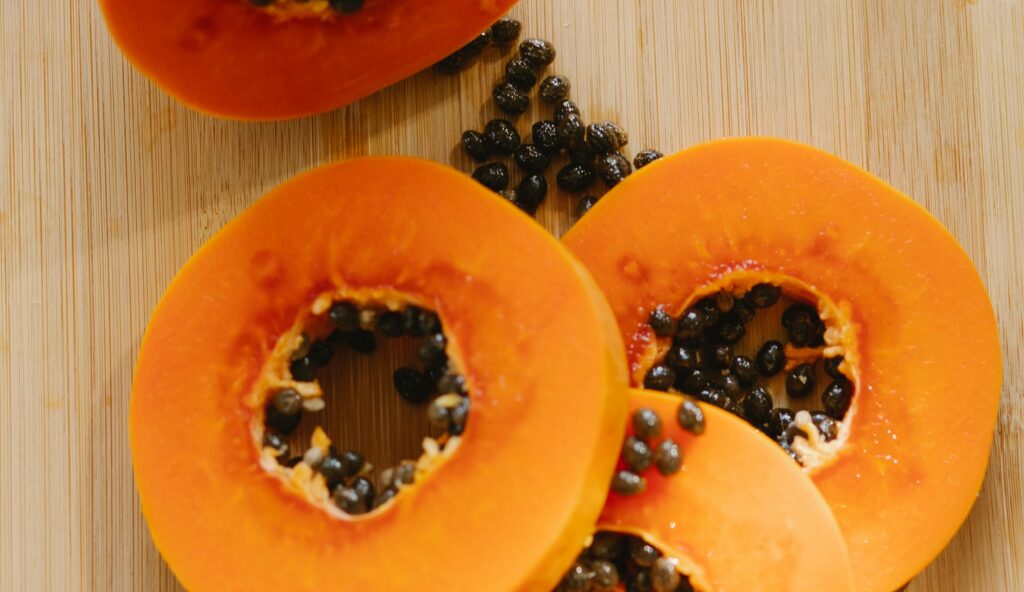
Papaya, a tropical fruit brimming with nutrients, often finds its way into our diets. However, many pet owners wonder: can dogs eat papaya? The short answer is yes, but with certain caveats.
Papaya is rich in vitamins A, C, and E, which contribute to a dog’s overall health, boosting their immune system and promoting healthy skin and coat. Additionally, papaya contains digestive enzymes like papain, which can aid in breaking down proteins, potentially alleviating digestive issues in dogs. This makes it a beneficial treat, especially for dogs with sensitive stomachs.
However, moderation is crucial. While dogs eat papaya safely, overindulgence can lead to gastrointestinal upset, including diarrhea or an upset stomach. The high fiber content, while beneficial in small amounts, can cause digestive disturbances if consumed excessively. Moreover, always ensure that the seeds are removed before offering papaya to your dog, as they contain traces of cyanide and pose a choking hazard.
When introducing papaya to your dog’s diet, start with small pieces to observe any adverse reactions. If your dog tolerates it well, papaya can be a refreshing, low-calorie treat. It’s advisable to serve it fresh, as canned or dried papaya often contains added sugars or preservatives that are harmful to dogs.
In conclusion, dogs eat papaya not only for its delightful taste but also for its nutritional benefits. When served correctly, this vibrant fruit can be a healthy addition to your dog’s diet, offering a burst of vitamins and aiding digestion. Always remember, moderation and proper preparation are key to ensuring your dog enjoys the benefits of papaya without any negative side effects.
FAQ
Can dogs eat shrimp?
Yes, dogs can eat shrimp, but it should be cooked and free from seasoning. Raw shrimp can pose health risks due to bacteria and parasites.
Are pickles safe for dogs?
While cucumbers are safe, pickles are not recommended for dogs due to their high sodium content and potential digestive issues from the spices and vinegar used in the pickling process.
Is tuna safe for dogs?
Tuna can be given to dogs in moderation, but it is important to be cautious of mercury levels. Always choose cooked tuna and avoid those packed in oil or brine.
Can dogs eat raw chicken?
Raw chicken is controversial. While some advocate for raw feeding, it carries risks of bacterial contamination. Cooked chicken is a safer alternative.
Are olives safe for dogs?
Plain, unsalted olives can be safe for dogs in moderation, but be sure to remove the pits to prevent choking hazards.
Can dogs eat salmon?
Dogs can eat salmon, but it must be thoroughly cooked to eliminate the risk of parasites. Avoid smoked or cured salmon due to high sodium levels.
Are pecans safe for dogs?
No, pecans are not safe for dogs. They can cause gastrointestinal upset and may contain compounds that are toxic to pets.


